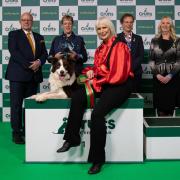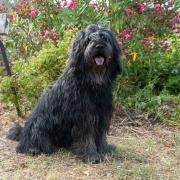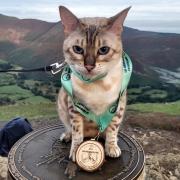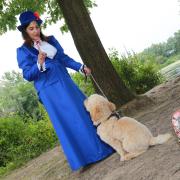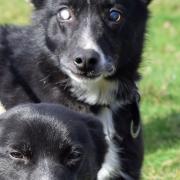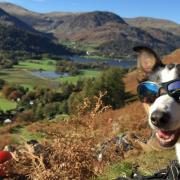A Lancashire Parachute regiment had a special member who jumped from planes and saved lives. Emily Rothery reports

Three members of the most unusual unit formed by the British army in the Second World War were given the tasks their fellow soldiers would have found impossible.
These paratroopers had an exceptional nose for trouble, not because they were specialist soldiers of the two-legged variety, as you might expect, but highly-trained dogs.
In 1941 appeals were made for dog owners to help the war effort. Brian, a two-year-old alsatian-collie cross and the smallest of his litter, was loaned to the Army War Dog Training School. He was trained for patrol duties as War Dog No.2720/671 before joining the 13th Lancashire Parachute Battalion in 1944.
Andrew Woolhouse spent five years researching the battalion and is author of the book ‘13 - Lucky for Some: The History of the 13th [Lancashire] Parachute Battalion.’ He believes Brian joined the battalion because Lance Corporal Ken Bailey had a veterinary background.

Bailey, from Liverpool, undertook the challenge of preparing the dogs for parachute jumps and later made drops alongside them.
He reports that training was tough and meant getting used to loud noises by sitting for hours in the fuselage of an aircraft with the propellers spinning at full pitch. They were also taught to sniff out explosives and to keep low to the ground when under fire. Their handlers also familiarised them with possible battlefield scenarios such as what to do if their master was captured and how to locate enemy soldiers.
After just two months they were ready. Brian was re-named Bing by the Paras and he served alongside fellow German shepherds Monty and Ranee. The dogs were fitted with specially designed parachutes and, when making a jump, they were lured out with pieces of meat.
L-Corp Bailey wrote about his first jump with Ranee. ‘The dog was 30 yards away and slightly above. The chute had opened and was oscillating slightly. Ranee looked slightly bewildered but showed no sign of fear. I called out and she immediately turned in my direction and wagged her tail vigorously.
‘The dog touched down 80 feet before I landed. She was completely relaxed, making no attempt to anticipate or resist the landing, rolled over once, scrambled to her feet stood looking around. I landed 40 feet from her and immediately ran to her, released her and gave her the feed.’
In June 1944 the 13th Battalion Paratroopers and their three dogs were sent to Normandy to take part in the D-day landings. Unfortunately, despite successfully completing several training jumps, things didn’t go according to plan for Bing. Surrounded by intense anti-aircraft fire, he initially stalled when the time came to jump. Having been helped to exit the plane, he then landed in a tree and came under fire before being cut down by the ever-vigilant Bailey.
Despite his daunting experience Bing was undeterred and eventually went on to distinguish himself locating mines and sniffing out enemy positions, thus saving countless Allies’ lives. Bailey wrote: ‘The dogs would sniff excitedly over a mine for a couple of seconds and then sit with a quaint mixture of smugness and expectancy.’
Bing was scarred from minor wounds but survived and later took part in Operation Varsity, the crossing of the Rhine - the last airborne operation of the war. During one mission the brave dog saved his comrades from ambush when he indicated that he had detected the scent of enemy troops in a house. The German soldiers were surrounded and taken prisoner. Bing was acknowledged as a hero.
Bing remained on active duty as a guard dog, watching over ammunition dumps and airfields in Germany until 1946. Despite requests, his former owner, Betty Fetch, refused to let him remain with the army. In 1947 he went on to receive the Dickin Medal for true valour - the highest military honour that an animal can win.
Bing returned happily to his old life and despite his years amongst men in uniform, spent much of his time chasing postmen – perhaps he thought they were Germans.
Bing, now called Brian once again, died at the age of 13 and had the distinction of being commemorated in the Airborne Assault museum, Duxford where his medal and a life size replica of this remarkable dog, complete with parachute can be seen.




